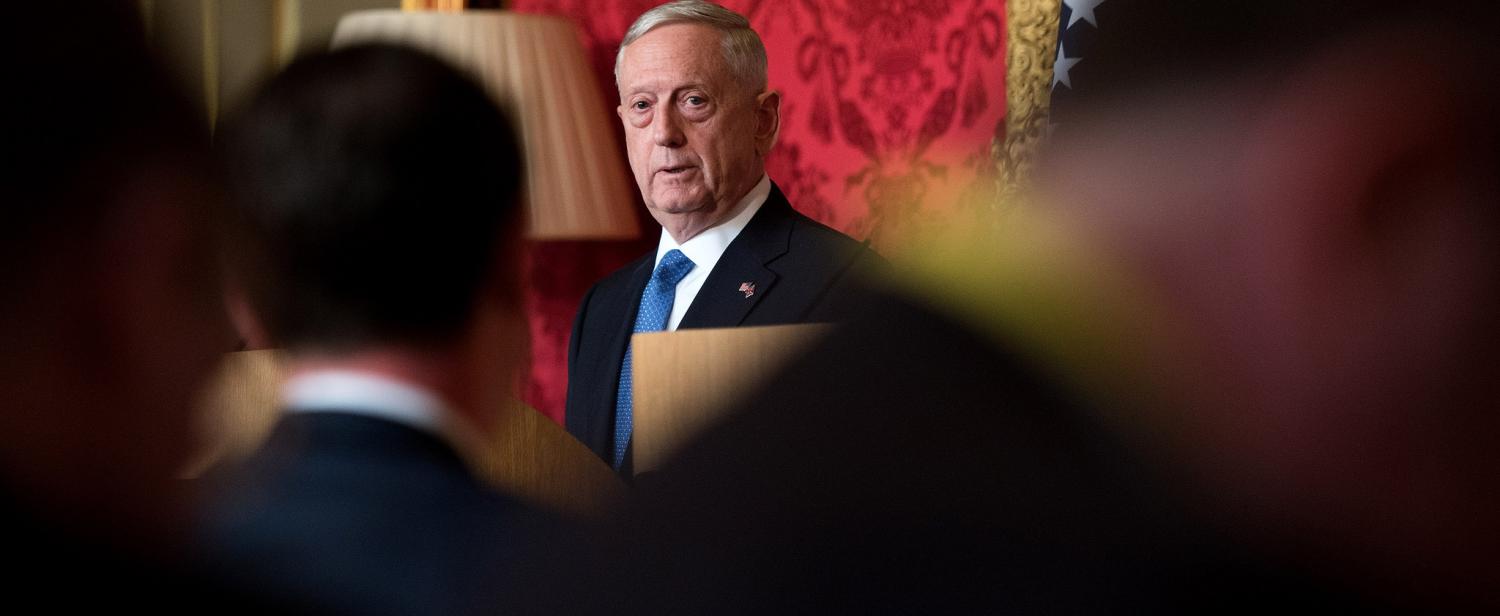US Defense Secretary James Mattis has resigned. And yes, I use that term advisedly, because even though President Donald Trump is tweeting about Mattis’ “retirement”, it’s pretty clear that this is a resignation letter, not a retirement letter. And a pretty brutal one, too, by the formal and polite standards of the genre. There’s not a word of praise for Trump in the entire thing, and Mattis speaks bluntly about “showing respect to...allies” and “being clear-eyed about both malign actors and strategic competitors”.
Trump has never said he wants a bigger US military in order to serve allies or defend the rules-based order; he just wants to make America great again.
Trump, Mattis says, deserves a defense secretary “whose views are better aligned with yours”. Let’s come back to that because it is rather consequential. But first, why did Mattis resign?
Well, the letter seems consistent with reporting dating back at least a few months of Mattis and Trump clashing on policy. The two men apparently dined regularly early in the life of the administration, but we knew things were really rocky when Trump said in October that Mattis was “sort of a Democrat” and that “He may leave. I mean, at some point, everybody leaves.”
According to the New York Times, it was Trump’s sudden decision to remove US troops from Syria that finally prompted Mattis’ resignation. Again, this would align nicely with prevailing wisdom about the differences between the two men. Mattis is seen as a conventional centre-right American foreign-policy figure. He spoke regularly about the rules-based order and America’s duty to lead it globally. He was a staunch supporter of America’s alliance network and of using US military strength to assert American values and interests globally.
To many, this made Mattis “the adult in the room” because Trump stands for none of those things. If his views intersected with Mattis at all, it was on the question of growing America’s military strength, and it is notable that Trump’s tweets announcing Mattis’ “retirement” focused on that subject. But Trump has never said he wants a bigger US military in order to serve allies or defend the rules-based order; he just wants to make America great again.
Now Mattis is leaving because of Trump’s sudden decision to remove 2000 troops from Syria. Given that there are 40,000 more US troops in the Middle East, this decision alone doesn’t seem like a mortal blow to the worldview Mattis stood for, but presumably, he saw it as a matter of principle. Or perhaps Mattis saw another blow coming: the US media is now reporting that Trump is also considering an Afghanistan withdrawal.
Let’s now return to that letter, and specifically Mattis telling Trump that he deserves a defense secretary “whose views are better aligned with yours”. Does such a person actually exist? Trump has had enormous trouble staffing his administration because his views are so unorthodox. There are very few Russia specialists, for instance, who admire Putin as much as Trump seems to. And there aren’t many qualified economists who argue in favour of tariffs.
As Patrick Porter has argued, the same logic applies to Trump’s broad foreign policy vision, which has been applied in only the most scattershot way because so few people in his own administration buy into it. The people who make up the senior levels of the US foreign policy and national security establishment all tend to share Mattis’ worldview.
Trump, of course, has the option of replacing Mattis with a lackey with no knowledge of the Defense Department and US national security. But if he wants the department led by someone who knows the defence-industrial complex, and who has been around US defence and foreign policy for long enough to build experience and a reputation for competence, then he will almost certainly have to choose another “adult”.
What does all this mean for Asia and Australia? Well, if 2018 was the year the US announced that it saw China as a peer competitor, then perhaps next year we will get a better sense of whether the US really wants to compete.
Are America’s interests in Asia important enough that it will be prepared to embark on a strategic contest with China that will be bigger and more difficult than the Cold War with the Soviets? The answer may depend on whose vision prevails inside the White House: that of the President himself, who has a narrow definition of American greatness which insists on better trading terms with China but has little interest in a larger strategic contest, or that of the US foreign policy establishment, which insists that US primacy in the Asia Pacific is non-negotiable. Mattis’ resignation is a small victory for the Trump vision, but it is far from decisive.
Finally, let's pause to consider the fact that the “adults”, while sharing a broadly similar worldview, don't always agree on policy. Mattis, it has been said, served as a break on the Trump administration's more militarist instincts in regard to North Korea, centred on National Security Adviser John Bolton but perhaps including the President himself. Who is now left to tell Trump that there is no viable military solution to the North Korea problem?

